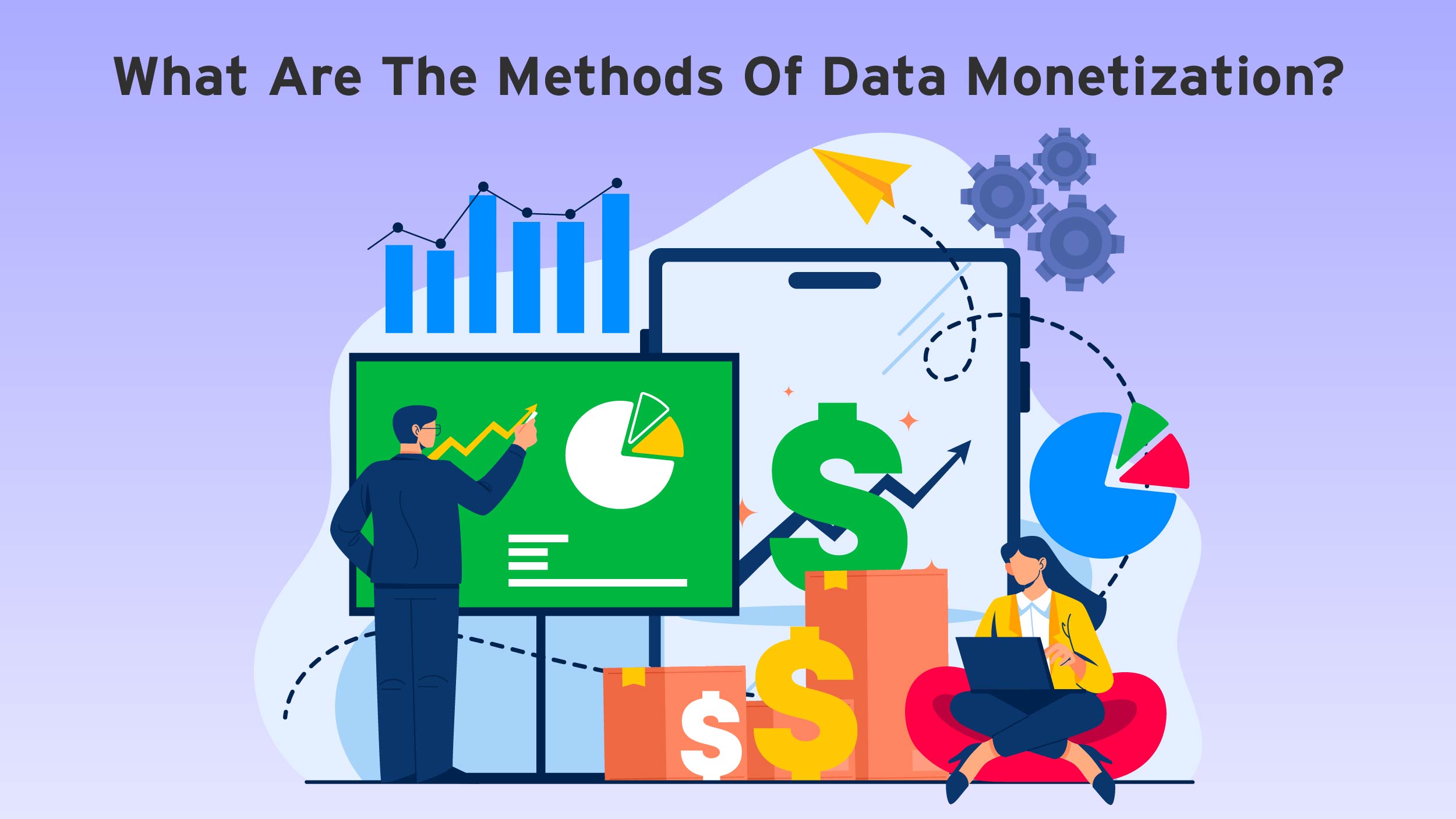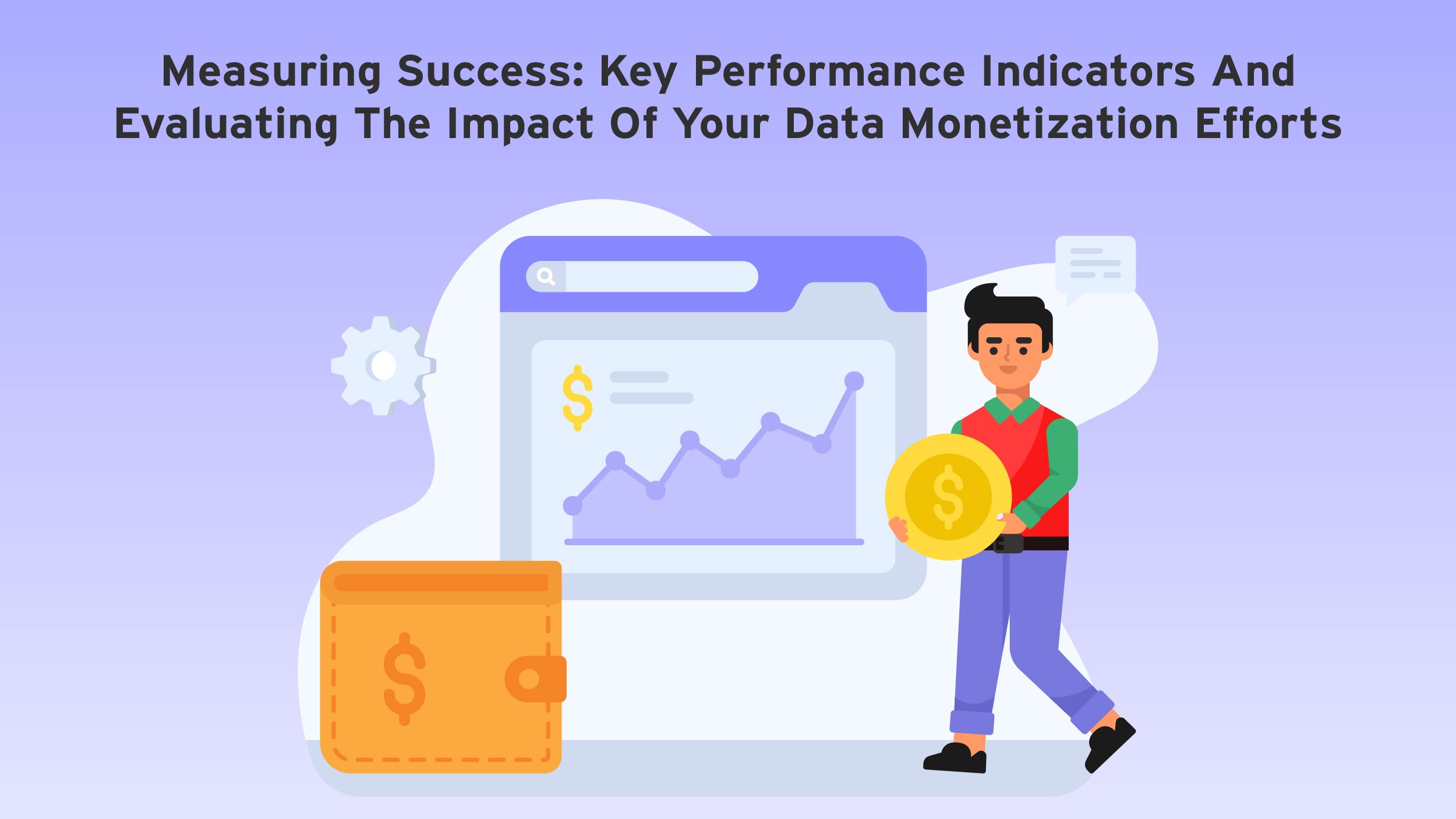In today’s data-driven world, the potential value of data cannot be underestimated. Businesses of all sizes and industries are now recognizing the power of data monetization as a way to unlock new revenue streams and gain a competitive edge. However, successfully monetizing data requires a strategic approach and a deep understanding strategies available. In this guide, we will explore the world of data monetization and provide you with actionable insights to help you develop a successful monetization strategy.
What Is Data Monetization?
Data monetization (DM) is the practice of deriving tangible economic value from an organization’s data. This entails leveraging data to boost revenue, enhance operational efficiency, and drive informed decision-making processes. As per reports, the global data monetization market is set to hit $9.10 billion by 2030. Let’s learn about this billion-dollar industry.
What Are The Methods Of Data Monetization?

Discover various strategies for organizations to monetize their data effectively:
- Internal Data Monetization: Utilize data internally to drive profits, cost savings, or risk mitigation, requiring fewer security and legal measures.
- External Data Monetization: Sell data directly or act as a broker to external parties, offering data-related services or products for a fee.
- Data as a Service (DaaS): Package and offer data to customers as a service, allowing them to leverage it for diverse purposes.
- Insight as a Service: Provide clients with actionable insights derived from data analysis, aiding them in making informed decisions.
- Analytics-Enabled Platform as a Service: Offer a platform enabling customers to access and analyze data independently, providing tools for data-driven insights.
- Embedded Analytics: Integrate data analytics directly into existing products or services, enhancing their value and user experience.
Also Read : Nanomaterials: A Beginner’s Guide to Understanding the World of Nanotechnology
By aligning data strategy with business needs and selecting appropriate tools and platforms, organizations can unlock the economic potential of their data assets.
Why is Data Monetization Important?
In order to successfully monetize your data, it is imperative to understand the true value it holds for your business. By identifying and leveraging key insights, you can unlock new opportunities for revenue generation and strategic decision-making.
One of the first steps in understanding the value of your data is to conduct a thorough analysis of the information you have. This involves categorizing and organizing the data, as well as identifying any patterns or trends that may emerge. By gaining a clear understanding of the insights your data can provide, you can determine the most effective monetization strategies.
Additionally, it is important to consider the context in which your data exists. Understanding industry trends, customer preferences, and the competitive landscape can help you identify areas where your data can create the most value.
How To Craft Effective Data Monetization Strategies
Crafting effective DM strategies requires careful consideration of various factors, including pricing models and customer segmentation. Determining the right pricing model for your data is crucial in order to maximize revenue. You can choose from various approaches, such as subscription-based pricing, pay-per-use, or tiered pricing.
Customer segmentation is another critical aspect of monetization. By understanding your audience and their specific needs, you can tailor your data offerings to align with their requirements. This enables you to attract and retain customers more effectively, driving higher revenue and customer satisfaction.
Furthermore, it is important to continuously evaluate and adapt your DM strategies as market dynamics change. Regularly monitoring and analyzing the performance of your data offerings allows you to identify areas for improvement and capitalize on emerging opportunities.
Measuring Success: Key Performance Indicators And Evaluating The Impact Of Your Data Monetization Efforts

In order to ensure the success of your DM efforts, it is crucial to measure your progress and evaluate the impact of your strategies. This can be done by establishing key performance indicators, or KPIs, that align with your objectives.
First and foremost, determine what metrics are important to your business. Are you looking to increase revenue, acquire new customers, or improve customer retention? Once you have identified your goals, choose KPIs that directly reflect these objectives. For example, if your goal is to increase revenue, you might track metrics such as average customer spend, conversion rates, or customer lifetime value.
Regularly monitor and analyze these KPIs to gain valuable insights into the effectiveness of your monetization strategies. Are they driving the desired outcomes? Are there any patterns or trends emerging from the data? By evaluating this information, you can make data-driven decisions and make adjustments to your strategies as needed.
Remember, it’s not enough to simply measure the performance of your DM efforts. It’s also important to assess the overall impact on your business. This can be done by tracking metrics such as return on investment (ROI), profitability, or market share. By evaluating the financial and operational impact of your strategies, you can determine if they are generating the desired results and adjust your approach accordingly.
Final Takeaway
Data monetization is a strategic approach that allows organizations to unlock the economic value of their data assets. By leveraging internal and external methods, organizations can generate revenue, improve business performance, and make informed decisions based on data insights. Whether through internal data utilization, external data sales, data-as-a-service, or other methods, DM offers a range of opportunities for organizations to maximize the potential of their data. By implementing effective data strategies and leveraging the right tools and platforms, organizations can harness the power of data to drive growth, gain a competitive edge, and create new business opportunities in today’s data-driven landscape.




